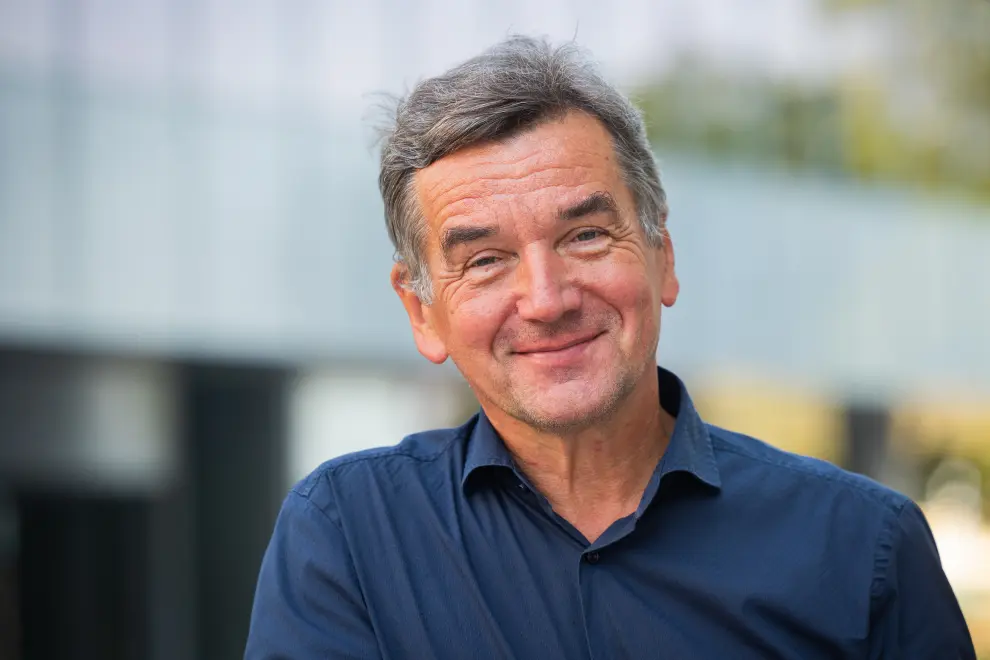Cross-border European Capital of Culture aims for lasting impact
The city of Nova Gorica and its Italian neighbour Gorizia are counting down to the 2025 European Capital of Culture (ECOC) when they will host more than one event per day on average. Head of programme Stojan Pelko says most of the events will be admission-free.
The grand opening ceremony is scheduled for 8 February to coincide with Slovenia's Culture Day. Talking with the Slovenian Press Agency, Pelko would not yet disclose the details except from saying that it will truly merge Nova Gorica and Gorizia into a single city and that 10% of the programme budget will be spent on it.
"All I can say is that the opening ceremony will be a kind of grand preview of the best of what the ECOC will bring throughout the year. And it has many dimensions, not just highly artistic, but community, sustainability, inclusive, sporting and other aspects. All of this will be seen in the opening ceremony."
Border and the Soča as recurring themes
The ECOC will involve more than 200 projects and will have two recurring themes, a red one and a green one. The red one is the border, the slogan being Go Borderless, while the green one symbolises the emerald Soča River.
"All the projects fundamentally question our relationship with borders - be they between countries, cultures, or eras. A border might even manifest itself as a habit that needs changing. In our case, we have two nations, two countries, and two cities that endured traumatic experiences in the past but now coexist in peace," Pelko says.
"We're also fortunate to be in a region where not only has the border between the two countries dissolved, but we can also explore transcending cultural boundaries through gastronomy and viticulture, discuss the battle against anti-fascism through church frescoes, and continue to break down remaining barriers."

Stojan Pelko, programme head of the European Culture Capital 2025. Photo: Bor Slana/STA
Talking about the green theme, Pelko notes that the ECOC region is stretching from Mount Triglav, the source of the Soča, to its mouth in the Adriatic Sea on the Italian side. "This green thread also represents our project's sustainable nature and our efforts to be as carbon-neutral as possible."
The organizers are also not shying away from difficult topics such as the history of the Soča Valley-located cement factory Salonit Anhovo. "We're trying to look for elements that can be used constructively for the future. The questions being raised include: Is there any concrete so uncontaminated that we can build something with it, or is the accessibility of their quarry such that it could serve as a venue for a contemporary dance performance?"
Local greats in spotlight
Outlining some of the programme highlights, Pelko says it is fortunate that several locals who found success abroad are returning through the ECOC. These include theatre director Tomi Janežič, pianist Alexander Gadjiev, interdisciplinary artist Marko Peljhan, and film director Gregor Božič.
The programme will also showcase figures who are integral to the local tradition but perhaps not fully recognised in Europe for their origins or the full scope of their work, such as renowned architect Edvard Ravnikar (1907-1993), influential painter Zoran Mušič (1909-2005), and pioneering psychiatrist Franco Basaglia (1924-1980).
Pelko says that this will be the first real cross-border ECOC, while pointing out that Nova Gorica won the project in competition with other Slovenian cities precisely because it invited Gorizia to participate.
"We have been having excellent cooperation both with the Gorizia municipality and the Friuli-Venezia Giulia region, which are strategically investing in certain projects that enrich our official programme, but they are doing this in partnership with us."
Solving problems for the future
Reflecting on the mistakes made by Maribor, the Slovenian ECOC host city in 2012, where plans for a long-term impact on the city's culture programme did not really come to fruition, Pelko says too much focus was put on infrastructure.
While some of the ideas were good, they proved too ambitious to implement, but the perception that nothing lasting remained is not entirely fair, Pelko says, pointing to events taking place at the renovated Vertinjski Dvor cultural centre and the progress made at other venues in Maribor old town.
"We are not repeating this mistake. We are not building anything new. We are using existing spaces and filling them with new content," he says. Things have changed radically in the past twelve years, including the ECOC concept, which mostly gives the stage to smaller towns, where the focus in not on the glamour of the past but on solving problems for the future.
"I believe we'll do the most for the reputation of Slovenian culture and for the future of the region if we address the biggest issues competently, relevantly, and substantively: why the cultural sector is underfunded, why occasional tensions still exist across the border, why languages aren't yet fully equal, why polluters don't belong on the banks of the Soča etc."
The criteria for the success of the project will not be visitor numbers or economic impact, but the quality and sustainability of cultural production. The project serves as a stress test for the Slovenian cultural market, highlighting the importance of stable funding for nurturing talent and ambitious content.
Success will be determined by achieving stability, accountability, and multi-year planning in cultural funding for Nova Gorica and surrounding municipalities. The ECOC aims to be a laboratory for experiments that could inform national policy on supporting cultural workers, ensuring sustainability, and modernising various sectors, says Pelko.


